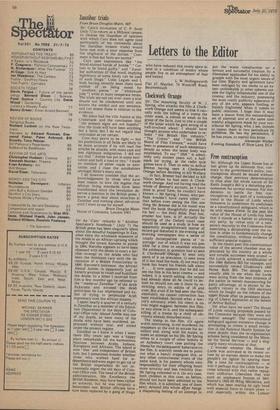Clockwork Orange
Sir: The reasoning faculty of W. J. Spring, who attacks the film A Clockwork Orange and seems to link it causally with the killing of a tramp the other week, is almost as weak as his grasp of the facts. Just to cite a couple of the latter which he gets wrong or is half-involved about: I should have thought anyone who undertakes to rebuke "the British film industry." " The Critics" and " the British Board of Film Censors," would have been in possession of such elementary details as when the latter body was established. To say " 1928 " is admittedly only sixteen years out: a halfmark for trying, as the radio quiz games have it. Then to refer to Arthur Bremer having seen A Clockwork Orange before deciding to kill Wallace . In fact, Bremer had decided to kill Nixon before he had seen A Clockwork Orange. And not having read the whole of Bremer's account, as I have done in proof form, he couldn't have known — Mr Spring, I mean, who perhaps wouldn't have cared either — that before even seeing the film one thing Mr Bremer did in his motel was read the book thoughtfully placed by his bed — the Holy Bible. Post hoc, propter hoc here, is it? Actually the. reporting of the Oxford court case should be used as a study in how an apparently straightforward matter of record got distorted in the evening and morning newspapers into a series of totally incompatible pieces of reportage' out of which it was not possible for a time to establish whether the adolescent in question had a) seen A Clockwork Orange, b) seen only parts of it on television, c) seen none of it but read the book, d) not read the book but heard his friends talk about it . . . It now appears that he did not see the film in his local cinema — and indeed, it is worth adding, the censor had already done all he could to ensure he should not see it there by restricting entry to adults of 18 and over. But even if he had seen the film, absolutely no causal connection has been established, beyond what a lawyer's advocacy when his client is on trial might suggest, between this film, or any scene in it, and the subsequent killing of a tramp by a child of obviously already disturbed mind.
The tramp in the film, it's again worth mentioning, is not murdered: he reappears at the end to accuse his assailant and, along with his mates, to make an attempt on his life. Mr Spring refers to a couple of other fathers in an Aylesbury court case putting the blame for the del inquents' beha viour on the film. It scarcely needs me to point out what a handy scapegoat this, or any other controversial event of the same kind, is for parents whose own responsibility for their offspring bears more scrutiny and less credulity than Mr Spring extended to it. (In any case, both children in this case, as before, should not have been admitted to the film which, it is admitted, one of them saw). Around this whole affair hangs a disquieting feeling of an attempt to put the worst construction on a serious and successful creation by a filmmaker applauded for his ability to grapple with the most urgent issues of our time. Bigotry and ignorance have' been indulged by the media to an ex tent unthinkable in other spheres outside the highly inflammable one of the cinema; and the industry, possessing the most costly publicity apparatus of any of the arts, appears footling or frankly frightened when it comes to public relations. I hope that it may learn a lesson from the extraordinary set of alarmist and at the same time wishful allegations made by your contributor Mr Spring, who, 1 see, intends to repeat them in two periodicals he publishes. He has my permission, if he has yours, to reprint this letter. Alexander Walker Evening Standard, 47 Shoe Lane, EC4






























 Previous page
Previous page